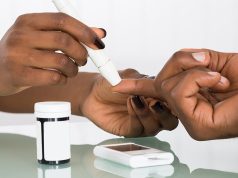Risk for MACE lower in adult-onset T1D versus T2D, but mortality higher from diabetic coma or ketoacidosis
By Elana Gotkine HealthDay Reporter
FRIDAY, May 16, 2025 (HealthDay News) — Adult-onset type 1 diabetes (T1D) is associated with an increased risk for death and major adverse cardiovascular events (MACE), according to a study published online May 14 in the European Heart Journal.
Yuxia Wei, from the Karolinska Institutet in Stockholm, and colleagues examined mortality, MACE, and prognostic factors in adult-onset T1D, especially among those diagnosed at age 40 years or older. Data were included for individuals with adult-onset T1D (10,184 participants) or type 2 diabetes (T2D; 375,523) in 2001 to 2020 and 509,172 population controls.
The researchers found that compared with population controls, people with T1D had a higher incidence of MACE (hazard ratio, 1.30), all-cause mortality (hazard ratio, 1.71), and mortality from cardiovascular or noncardiovascular disease, cancer, or infection. Compared with those with T2D, they had lower MACE incidence (hazard ratio, 0.67) and higher mortality from diabetic coma or ketoacidosis (hazard ratio, 7.04). Most deaths were accounted for by smoking (population attributable risk fraction, 10.7 percent) and glycated hemoglobin (HbA1c) ≥53 mmol/mol (10.4 percent), while most MACE events in T1D were accounted for by overweight/obesity, smoking, and high HbA1c (19.8, 8.4, and 8.8 percent, respectively). Similar results were seen for those diagnosed with T1D at age 40 years or older, although lower insulin pump use and higher HbA1c were seen when compared with those diagnosed earlier.
“We show that the prognosis can be significantly improved by preventing smoking and obesity and improving glucose control, not least in people diagnosed at older ages,” senior study author Sofia Carlsson, Ph.D., also from the Karolinska Institutet, said in a press release. “We hope to shed light on these issues in the coming years.”
One author disclosed ties to the biopharmaceutical industry.
Copyright © 2025 HealthDay. All rights reserved.








